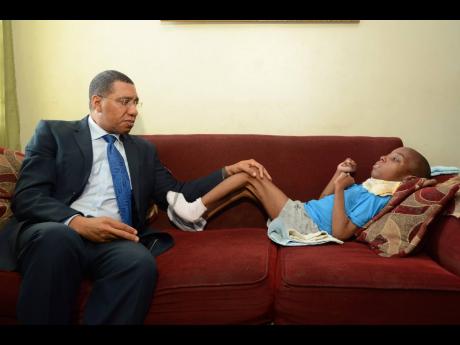NO $40M PAYOUT FOR TAHJAY - Judgment reversed for boy with brain damage
The Court of Appeal has quashed a 2015 ruling of the Supreme Court that had awarded approximately $40 million to the family of 16-year-old Tahjay Rowe, who sustained brain damage when he was born at the Victoria Jubilee Hospital.
The court has labelled some of the conclusions of Supreme Court Justice Audre Lindo as “plain wrong” in the 95-page judgment.
Tahjay was born at the Victoria Jubilee Hospital in April 2004 to a then teenage Tasha Howell as a “postterm neonate” – meaning his birth was after his due date.
He was subsequently determined, having been discharged after a fortnight in hospital, to have suffered damage from bleeding in the brain, which Victoria Jubilee and its parent organisation, the South East Regional Health Authority (SERHA), attributed to a hereditary condition that would have been “unpredictable and untreatable during the mother’s pregnancy”.
In 2009, Tahj’s mother sued Victoria Jubilee and SERHA. Experts, on her behalf, argued that the medical interventions afforded to the mother and baby, in the circumstances of the birth, had been inadequate.
In 2015, the Supreme Court found that the institution and its doctors and nurses had failed in their duty of care to the patient.
That led the court to order a big payout that would cover the cost for his healthcare.
Not a cent was paid over as the hospital had challenged the ruling on six grounds.
The family desperate and Rowe’s situation being highlighted in The Sunday Gleaner, Prime Minister Andrew Holness donated an undisclosed sum of money to the family in July 2018.
In a major turn of events, the Court of Appeal found that there was no evidence that the treatment given to the respondent, by the hospital staff, had fallen below the requisite standard of ordinarily skilled professionals exercising the skills expected of the doctors and midwives who treated him.
Experts who appeared before the court could not pinpoint exactly when the injuries occurred, casting doubt on whether the hospital had been culpable.
“Not only did the experts not say the injury was likely caused by the acts or omissions of the hospital staff, they were unable to say that the failures they identified contributed to, or in any way aggravated, the respondent’s injuries,” the judgment read.
The matter was heard before justices Dennis Morrison, president of the Court of Appeal; Jennifer Straw; and Carol Edwards, who wrote the unanimous judgment.
“It could be said that the medical staff were negligent in failing to order brain imaging earlier in the face of the respondent’s symptoms, which suggested brain trauma, but there was no evidence that this failure led to, or aggravated, his brain injury,” Edwards reasoned.
The Court of Appeal also said that there was no basis on which the Supreme Court found that there was a breach of duty of care in the monitoring of the respondent’s mother prior to, or during, delivery.
“It was clearly a finding made with no evidentiary support and it, too, cannot be allowed to stand,” the judgment stated in part.
The Court of Appeal criticised the Supreme Court justice for concluding that a midwife was unable to recall what had happened at Tahj’s birth. The Supreme Court justice had said the midwife’s inability to recall “spoke volumes” to the hospital’s negligence.
Doctors were also criticised by Justice Edwards, who said she was concerned about the delay in their conducting cranial imaging as part of the investigations into Tahj’s symptoms of a seizure, bulging fontanelles, hydrocephaly, and macrocephaly.
“It seems to me nonsensical, in the circumstances, to order cranial imaging at the point of discharge, for if it was necessary when the child appeared healthy when he was being discharged, it must have been even more necessary earlier when he was showing symptoms,” the justice said.
Still, the appeal court said the judge “went too far” to equate the management and care of the respondent’s symptoms with his treatment to ascribe negligence to the hospital.
Attorney-at-law Alexander Williams, who represented Tahj and his mom, said on Thursday that the family was declining comment.

